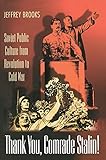Thank You, Comrade Stalin! : Soviet Public Culture from Revolution to Cold War / Jeffrey Brooks.
Material type: TextPublisher: Princeton, NJ : Princeton University Press, [2021]Copyright date: ©1999Description: 1 online resource (344 p.) : 41 halftonesContent type:
TextPublisher: Princeton, NJ : Princeton University Press, [2021]Copyright date: ©1999Description: 1 online resource (344 p.) : 41 halftonesContent type: - 9781400843923
- Journalism -- Soviet Union
- Popular culture -- Soviet Union
- HISTORY / Russia & the Former Soviet Union
- ARCOS
- Academy of Sciences
- Baidich, Khristina
- Baltic republics
- Bolshevik Party
- British Broadcasting Corporation
- Chapayev
- Decembrist rebellion
- Doctor Zhivago
- Dudintsev, Vladimir
- Enlightenment
- Eurasianism
- Finland
- First Congress of Soviet Writers
- Genoa Conference
- Great Depression
- Jewish Antifascist Committee
- Komsomol
- Krestinskii
- Kukryniksy
- League of Nations
- Leningrad blockade
- Magnitogorsk
- Nazi Germany
- Pan-Slavism
- Petrograd Telegraph Agency
- active Soviet public
- agenda setting
- agriculture
- anticosmopolitan campaign
- antifascism
- bureaucracy
- canonization
- citizenship
- foreign opinion
- global economy
- holocaust
- homeland
- human interest stories
- isolationism
- liminal phase
- mass newspapers
- methodology
- modernism
- obituaries
- orphans
- passports
- popular culture
- religion
- science fiction
- self-denial
- 947 21
- DK266.4
- DK266.4 .B76 2000
- online - DeGruyter
| Item type | Current library | Call number | URL | Status | Notes | Barcode | |
|---|---|---|---|---|---|---|---|
 eBook
eBook
|
Biblioteca "Angelicum" Pont. Univ. S.Tommaso d'Aquino Nuvola online | online - DeGruyter (Browse shelf(Opens below)) | Online access | Not for loan (Accesso limitato) | Accesso per gli utenti autorizzati / Access for authorized users | (dgr)9781400843923 |
Browsing Biblioteca "Angelicum" Pont. Univ. S.Tommaso d'Aquino shelves, Shelving location: Nuvola online Close shelf browser (Hides shelf browser)

|

|

|

|

|

|

|
||
| online - DeGruyter The Making of the Magdalen : Preaching and Popular Devotion in the Later Middle Ages / | online - DeGruyter The Changing Role of Women in Bengal, 1849-1905 / | online - DeGruyter The Domestication of Desire : Women, Wealth, and Modernity in Java / | online - DeGruyter Thank You, Comrade Stalin! : Soviet Public Culture from Revolution to Cold War / | online - DeGruyter The Four Masterworks of the Ming Novel : Ssu ta ch'i-shu / | online - DeGruyter Streetwalking on a Ruined Map : Cultural Theory and the City Films of Elvira Notari / | online - DeGruyter Family Planning in Japanese Society : Traditional Birth Control in a Modern Urban Culture / |
Frontmatter -- Contents -- Illustrations -- Acknowledgments -- Prologue -- One. The Monopoly of the Printed Word: From Persuasion to Compulsion -- Two. The First Decade: From Class War to Socialist Building -- Three. The Performance Begins -- Four. The Economy of the Gift: "Thank You, Comrade Stalin, for a Happy Childhood" -- Five. Literature and the Arts: "An Ode to Stalin" -- Six. Honor and Dishonor -- Seven. Many Wars, One Victory -- Eight. The Theft of the War -- Epilogue. Renewal, Stagnation, and Collapse -- Notes -- Index
restricted access online access with authorization star
http://purl.org/coar/access_right/c_16ec
Thank you, our Stalin, for a happy childhood." "Thank you, dear Marshal [Stalin], for our freedom, for our children's happiness, for life." Between the Russian Revolution and the Cold War, Soviet public culture was so dominated by the power of the state that slogans like these appeared routinely in newspapers, on posters, and in government proclamations. In this penetrating historical study, Jeffrey Brooks draws on years of research into the most influential and widely circulated Russian newspapers--including Pravda, Isvestiia, and the army paper Red Star--to explain the origins, the nature, and the effects of this unrelenting idealization of the state, the Communist Party, and the leader.Brooks shows how, beginning with Lenin, the Communists established a state monopoly of the media that absorbed literature, art, and science into a stylized and ritualistic public culture--a form of political performance that became its own reality and excluded other forms of public reflection. He presents and explains scores of self-congratulatory newspaper articles, including tales of Stalin's supposed achievements and virtue, accounts of the country's allegedly dynamic economy, and warnings about the decadence and cruelty of the capitalist West. Brooks pays particular attention to the role of the press in the reconstruction of the Soviet cultural system to meet the Nazi threat during World War II and in the transformation of national identity from its early revolutionary internationalism to the ideology of the Cold War. He concludes that the country's one-sided public discourse and the pervasive idea that citizens owed the leader gratitude for the "gifts" of goods and services led ultimately to the inability of late Soviet Communism to diagnose its own ills, prepare alternative policies, and adjust to new realities.The first historical work to explore the close relationship between language and the implementation of the Stalinist-Leninist program, Thank You, Comrade Stalin! is a compelling account of Soviet public culture as reflected through the country's press.
Mode of access: Internet via World Wide Web.
In English.
Description based on online resource; title from PDF title page (publisher's Web site, viewed 07. Nov 2022)


